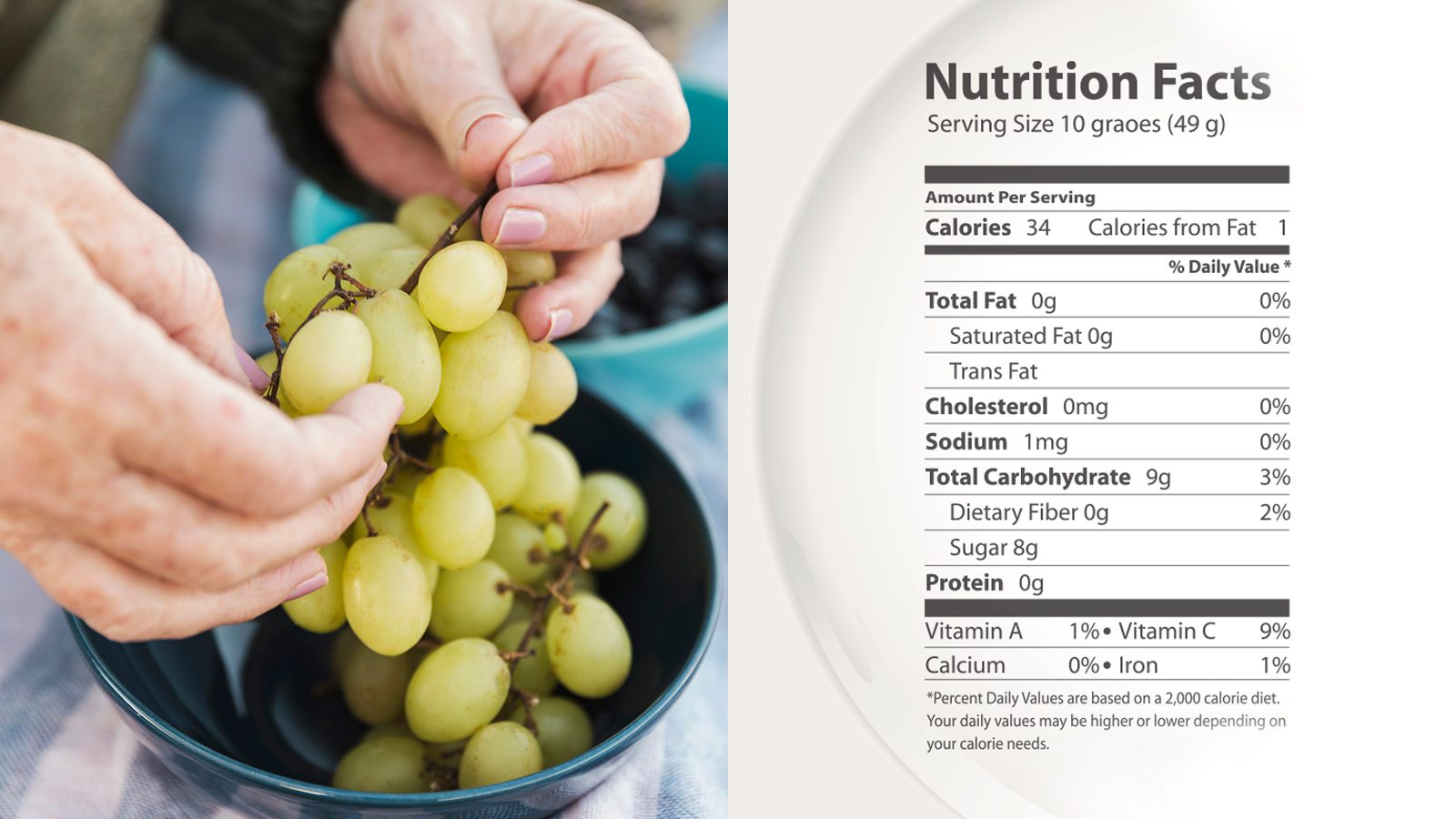Many researchers believe that grapes have more health benefits than previously considered. Of course, you know your eating impacts your body, brain, and overall wellness. Adding grapes to an already healthy diet could improve your overall health. Here is what science says happens to your body when you eat grapes as part of a well-balanced whole foods diet.
Grapes have a long history.
Eating grapes dates back thousands of years. Archeologists have found evidence that humans grew grapes as early as 6500 BC. The Middle East is the original homeland of this fruit–first cultivated approximately 6,000 to 8,000 years ago. Greek philosophers believed in the power of grapes to heal and restore health. Their skins contain yeast microorganisms, making grapes perfect for making wine. Today, there are approximately eight to ten thousand grapes in the world.
One study about grapes says we should consider them superfoods
A recent study about grapes found they’re rich sources of natural compounds. This twelve-week report found that eating grapes improves your vascular system and lowers oxidative stress. The benefits include lower blood pressure for those with mild to modest hypertension. Researchers believe that the length of treatment and the severity of hypertension plus the type of grape eaten made a difference in the treatment response.
Science suggests that eating grapes could positively impact your health and help you live longer. Although these cute fruits aren’t a cure-all, eating more fruits and vegetables benefits your health. Eating like this decreases your risk of these concerns:
- Heart problems
- Liver disease
- High blood pressure
- Diabetes
- Being overweight
Growing scientific evidence finds that eating nutritious whole foods instead of high fat, processed foods, and high sugar foods gives you optimal health and overall well-being.
What can eating two cups of grapes do to increase your well-being?
According to another study about grapes, eating just two cups daily decreases your chances of liver disease and improves longevity. The fatty liver disease leads to cirrhosis and liver cancer. Regular table grapes can play a part in reducing your chances of getting these diseases. According to the same study, eating grapes can benefit anyone regardless of diet.
But how? This sweet fruit can help your microbiome function. But in the past, they were left out of the gut health conversation.
But what is a microbiome? You may hear the term but wonder what that means.
A microbiome is a group of microorganisms living together in a specific habitat. Animals, plants, and animals have unique microbiomes. A healthy gut microbiome benefits your overall health and even influences your brain. Science suggests that adding grapes to your diet improves your gut health. Grapes are a type of insoluble fiber. Insoluble fiber helps regulate your bowel movements. Grapes contain a high amount of fructose. However, they’re still good to eat even if you have irritable bowel syndrome (IBS), which sugar may sometimes trigger. Grapes also increase the diversity of good gut bacteria and help boost your cholesterol metabolism.
Other healthful benefits include the following:
- Aids your heart health
- Lowers your blood sugar levels
- High in antioxidants
- Boosts your immune system
- Improves your mood and focus
- Supports bone health
Common table grapes
There are at least fifty grapes grown in California, the largest producer of this famous fruit in the United States. You can use grapes to make jam, wine, jelly, and juice. You can find varieties in assorted red, yellow, green, and black colors. Here are some typical table grapes you should try.
- Concord: Concords are dark purple with a bright berry flavor and are often used to make the classic purple grape juice. These dark purple grapes are delicious in jams, jellies, and flavored candy. In addition, the Concord species can make Kosher wine.
- Crimson Seedless: From May through October, you can find these reddish pink variants at your local grocery store. This fruit has a thicker skin giving it a longer shelf life and more tannins than other grapes. Tannins are plant-derived polyphenols that are beneficial to your health. Crimson seedless is the most common household species.
- Sultana: You might call them green grapes. Sultanas are one of the oldest varieties still in existence today. These greenish-white oval fruits are also called Thomas Seedless. They’re one of the most popular variations sold in grocery stores.
- Moon Drop: A long dark purple grape is sometimes called Witch’s Finger. These fruits have a delightfully crisp texture and sweetness. Moon Drops last longer in the fridge than most others. You can find them in season from July through September.
- Red Globes: Red globes have a large, round size. They’re suitable for freezing and make delicious and sweet juice.
- Cotton Candy Grapes: If you’re looking for some unique flavor, try this greenish-white variety. As the name implies, these fruits are sweet, just like cotton candy. Many people like these even though they sell for a limited time each year. They are a non-GMO species hybridized on the vine.
- Flame Seedless: Another typical variety you see in grocery stores. This reddish-purple grape is sweet and crunchy. Many people choose Flame Seedless over others for lunches and snacks.
What are the healthiest grapes to eat?
All species are good for you, but red and Concord grapes are the most nutritious. These grapes are high in phytonutrients, flavonoids, and resveratrol, a powerful antioxidant. Resveratrol benefits chronic conditions such as cancer, heart disease, and aging.
Healthy eating patterns for disease prevention
Many doctors support eating a Mediterranean diet for optimal health. This type of diet includes whole foods such as:
- Fish and chicken
- Plant-based foods
- Healthy fats like olive oil
- Beans
Eating a Mediterranean diet has been found to lower your risk of these conditions:
- Heart disease
- Stroke
- Diabetes
- Obesity
- Liver disease
What other whole foods should you eat?
Besides grapes, try these other whole foods that provide excellent nutritional benefits.
- Dark green veggies: Eat dark green vegetables at least three or four times a week. These foods include spinach, kale, green peppers, broccoli, and Brussels sprouts.
- Whole Grains: Choose whole grains over bleached and processed grains. Try eating at least two to three times a week. Good sources of whole grains include brown rice, oatmeal, whole wheat bread, and multigrain.
- Fish: Choose trout, herring, salmon, sardines, or tuna. Include fish on your weekly menu at least twice a week.
- Berries: Eating berries like blueberries, raspberries, strawberries, and blackberries boost your immune system. In addition, blackberries, raspberries, strawberries, and blueberries are rich in antioxidants.
- Beans and lentils: Lentils and beans are rich in protein. Lentils, black, pinto, kidney, and chickpeas are great for casseroles, stews, and soups.
- Soy: Soy protein is heart-healthy to lower your cholesterol levels. So consume foods like soybeans, tempeh, texturized vegetable proteins (TVP), and edamame.
- Nuts and seeds: Flaxseeds, pumpkin seeds, walnuts, and pistachios are excellent sources of plant proteins.
- Organic yogurt: Calcium is an essential mineral to add to your diet. Eat dairy products at least three to four times a day.
- Orange veggies: Dark orange veggies are high in beta-carotene, providing you with vitamin A that helps your skin, eyes, and immune system. Eat foods like carrots, sweet potatoes, butternut squash, and mango.
Are grapes good for losing weight?
Red grapes contain ellagic acid–rich in fat-burning properties. Researchers suggest that ellagic acid slows down the growth of fat cells in your body and helps form newer fat cells. They also contain resveratrol, a chemical compound that helps your body metabolize fatty acids. Resveratrol increases your energy levels and boosts your metabolism, which will help you lose weight. Besides that, the fruit contains flavonoids–potent antioxidants that researchers say help you maintain a weight-maintaining healthy diet.
Final thoughts on a study that recommends the consumption of two cups of grapes every day
Science has discovered that grapes have more health benefits than previously thought. A study on grapes acknowledges that we should consider grapes among the other “superfoods.” Adding grapes to your healthy diet will improve your overall health, helping with weight loss, lowering your blood pressure, and increasing heart health. Of course, what you eat impacts your body, your brain, and how well you feel. So, add a few of these different fruits and other whole foods to your daily menu. Grapes have nourished humans for thousands of years. So perhaps it is time for these delicious fruits to get the attention they deserve.


















